Dear Zazie, Here is today’s Lovers’ Chronicle from Mac Tag dedicated to his muse. Rhett
The Lovers’ Chronicle
Dear Muse,
© copyright 2020 mac tag/cowboy coleridge all rights reserved
© copyright 2019 mac tag/cowboy coleridge all rights reserved
comes a still voice,
from a distance
long sought for
long thought denied
melancholy nights
yes, but as it should be,
makes it all right
earned or deserved,
not sure which
but that matters not
the only purpose
must be served
yet
comes a still voice
i will listen
© copyright 2018 mac tag/cowboy coleridge all rights reserved
| Annibale Carracci | |
|---|---|

Self-portrait (Uffizi)
|
|
Today is the birthday of Annibale Carracci (Bologna; November 3, 1560 – July 15, 1609 Rome); painter, active in Bologna and later in Rome. Along with his brothers, Annibale was one of the progenitors of a leading strand of the Baroque style. Painters working under Annibale at the gallery of the Palazzo Farnese would be highly influential in Roman painting for decades.
Annibale was entombed, according to his wish, near Raphael in the Pantheon of Rome. It is a measure of his achievement that artists as diverse as Bernini, Poussin, and Rubens praised his work. Many of his assistants or pupils in projects at the Palazzo Farnese and Herrera Chapel would become among the pre-eminent artists of the next decades, including Domenichino, Francesco Albani, Giovanni Lanfranco, Domenico Viola, Guido Reni, Sisto Badalocchio, and others.
Gallery
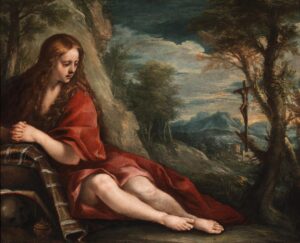


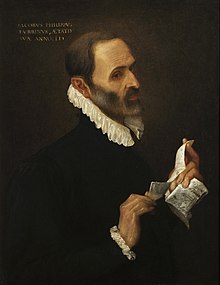




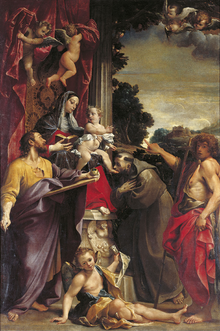
- Religious subjects
-
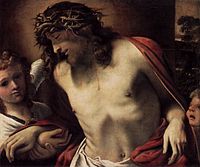
Christ Wearing the Crown of Thorns, Supported by Angels
-

The Samaritan Woman at the Well
-

The silent Madonna with Saint John the Baptist
-

Susanna in the bath
-

Pietà, Kunsthistoriche Museum, Vienna
-

Lamentation of Christ
-

Madonna and Child with St John
-
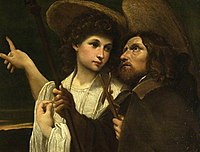
Saint Roch and the Angel
- Portraits
-

Self-portrait c. 1580
-

The Temptation of St Anthony Abbot (detail) 1597 and 1598
-

Head of an Old Man
-

Portrait of Dr Bossi.
- Mythological subjects
-

Venus and Adonis circa 1595
-
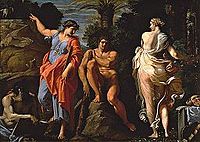
The Judgment of Hercules, 1596, National Museum of Capodimonte
-

Venus with a Satyr and Cupids, 1590
- Food related paintings
-
Boy Drinking by Annibale Carracci, 1582–83
-

The Beaneater, 1580-1590, Galleria Colonna, Rome
-
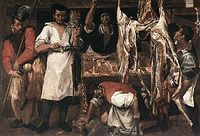
Butcher’s Shop (1580), Christ Church Picture Gallery, Oxford
-

The Butcher’s Shop, 1580, Kimbell Art Museum
| William Cullen Bryant | |
|---|---|
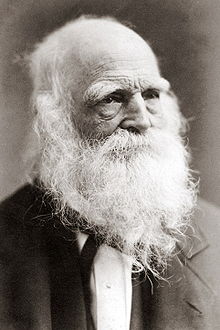
Cabinet card of Bryant, c. 1876
|
|
|
|
|
Today is the birthday of William Cullen Bryant (Cummington, Massachusetts; November 3, 1794 – June 12, 1878 New York City); romantic poet, journalist, and long-time editor of the New York Evening Post.
Verse
Thanatopsis
To him who in the love of Nature holds
Communion with her visible forms, she speaks
A various language; for his gayer hours
She has a voice of gladness, and a smile
And eloquence of beauty, and she glides
Into his darker musings, with a mild
And healing sympathy, that steals away
Their sharpness, ere he is aware. When thoughts
Of the last bitter hour come like a blight
Over thy spirit, and sad images
Of the stern agony, and shroud, and pall,
And breathless darkness, and the narrow house,
Make thee to shudder, and grow sick at heart;—
Go forth, under the open sky, and list
To Nature’s teachings, while from all around
Earth and her waters, and the depths of air—
Comes a still voice—
Yet a few days, and thee
The all-beholding sun shall see no more
In all his course; nor yet in the cold ground,
Where thy pale form was laid, with many tears,
Nor in the embrace of ocean, shall exist
Thy image. Earth, that nourished thee, shall claim
Thy growth, to be resolved to earth again,
And, lost each human trace, surrendering up
Thine individual being, shalt thou go
To mix for ever with the elements,
To be a brother to the insensible rock
And to the sluggish clod, which the rude swain
Turns with his share, and treads upon. The oak
Shall send his roots abroad, and pierce thy mould.
Yet not to thine eternal resting-place
Shalt thou retire alone, nor couldst thou wish
Couch more magnificent. Thou shalt lie down
With patriarchs of the infant world—with kings,
The powerful of the earth—the wise, the good,
Fair forms, and hoary seers of ages past,
All in one mighty sepulchre. The hills
Rock-ribbed and ancient as the sun,—the vales
Stretching in pensive quietness between;
The venerable woods—rivers that move
In majesty, and the complaining brooks
That make the meadows green; and, poured round all,
Old Ocean’s gray and melancholy waste,—
Are but the solemn decorations all
Of the great tomb of man. The golden sun,
The planets, all the infinite host of heaven,
Are shining on the sad abodes of death,
Through the still lapse of ages. All that tread
The globe are but a handful to the tribes
That slumber in its bosom.—Take the wings
Of morning, pierce the Barcan wilderness,
Or lose thyself in the continuous woods
Where rolls the Oregon, and hears no sound,
Save his own dashings—yet the dead are there:
And millions in those solitudes, since first
The flight of years began, have laid them down
In their last sleep—the dead reign there alone.
So shalt thou rest, and what if thou withdraw
In silence from the living, and no friend
Take note of thy departure? All that breathe
Will share thy destiny. The gay will laugh
When thou art gone, the solemn brood of care
Plod on, and each one as before will chase
His favorite phantom; yet all these shall leave
Their mirth and their employments, and shall come
And make their bed with thee. As the long train
Of ages glide away, the sons of men,
The youth in life’s green spring, and he who goes
In the full strength of years, matron and maid,
The speechless babe, and the gray-headed man—
Shall one by one be gathered to thy side,
By those, who in their turn shall follow them.
So live, that when thy summons comes to join
The innumerable caravan, which moves
To that mysterious realm, where each shall take
His chamber in the silent halls of death,
Thou go not, like the quarry-slave at night,
Scourged to his dungeon, but, sustained and soothed
By an unfaltering trust, approach thy grave,
Like one who wraps the drapery of his couch
About him, and lies down to pleasant dreams.
| Vincenzo Bellini |
|---|
 |
Today is the birthday of Vincenzo Salvatore Carmelo Francesco Bellini (Catania; 3 November 1801 – 23 September 1835 Puteaux); opera composer, known for his long-flowing melodic lines for which he was named “the Swan of Catania”. Bellini was the quintessential composer of the Italian bel canto era of the early 19th century.
In considering which of his operas can be seen to be his greatest successes, Il pirata laid much of the groundwork in 1827. Both I Capuleti ed i Montecchi at La Fenice in 1830 and La sonnambula in Milan in 1831 reached new triumphal heights, although initially Norma, given at La Scala in 1831 did not fare as well until later performances elsewhere. “The genuine triumph” of I puritani in January 1835 in Paris capped a significant career.
Bellini never married.
Bellini wanted to marry Maddalena Fumaroli but her parents refused. The success achieved by Bianca e Gernado gave Bellini fresh hope that her parents would finally relent, and a new appeal was made through a friend. This was rejected by Maddalena’s father, who returned all the letters which she had received along with a letter from him stating that “my daughter will never marry a poor piano banger (suonatore di cembalo)”.
At some time before March 1828, after the major success of Il pirata and just as Bellini was about to leave Milan for his production of Bianca e Ferdinando in Genoa, he received a notification from his go-between with the Fumarolis family that they had withdrawn their rejection of his proposal. But by then—with the efforts to build his career and with time and distance between him and Maddalena—his feelings had changed and, using Florimo to communicate to the family, he rejected the offer, expressing the feeling that he would be unable to support her financially. Even Maddalena’s own pleas in three letters which followed failed to change his mind. Good thinkin’ Bellini.
Giuditta Turina

The one significant relationship which Bellini had after 1828 was the five-year relationship with Giuditta Turina, a young married woman with whom he began an affair when both were in Genoa in April 1828 for the production of Bianca e Fernando. Their relationship lasted until Bellini went to Paris. Perhaps because her marriage was irrevocable and not based on love, and because the lovers were discreet, her husband, Fernandino, and his family seem to have tacitly permitted the relationship. Bellini’s letters to his friend Florimo indicate his satisfaction with the nature of the liaison, particularly because it kept him from having to marry—and thus becoming being distracted from his work. Exactly!
However, in May 1833 while he was in London, a change in Bellini’s relationship with Giuditta followed from the discovery by her husband of a compromising letter from Bellini. The result was that he decided to seek a legal separation and have her removed from his house. For Bellini, it meant the possibility of taking on responsibility for her, and he had no interest in doing that, having cooled in his feelings for her. When he wrote to Florimo from Paris the following year, he clearly stated that “I constantly am being threatened from Milan with Giuditta’s coming to Paris”, at which point he says he’ll leave that city if that were to happen. Then he continues: “I no longer want to be put in the position of renewing a relationship that made me suffer great troubles”. Ultimately, he resisted any long-term emotional commitment, and never married. Smart man!
And today is the birthday of Walker Evans (St. Louis, Missouri; November 3, 1903 – April 10, 1975 New Haven, Connecticut); photographer and photojournalist best known for his work for the Farm Security Administration (FSA) documenting the effects of the Great Depression. Much of Evans’ work from the FSA period uses the large-format, 8×10-inch (200×250 mm) view camera. He said that his goal as a photographer was to make pictures that are “literate, authoritative, transcendent”.
Gallery
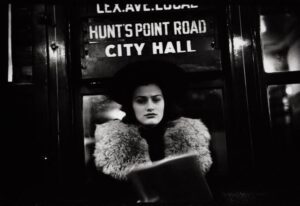
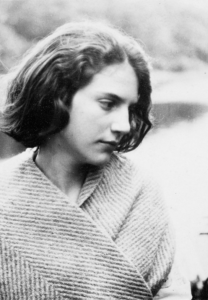
Carol Kalker. Greenwich, Connecticut. C. June 1929
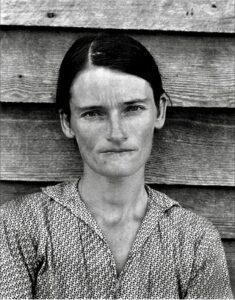
1936 photo of then-27-year-old Allie Mae Burroughs, a symbol of the Great Depression
Thanks for readin’ y’all,
Mac Tag


No Comments on "The Lovers’ Chronicle 3 November – comes a still voice – art by Annibale Carracci – verse by William Cullen Bryant – birth of Vincenzo Bellini – photography by Walker Evans"